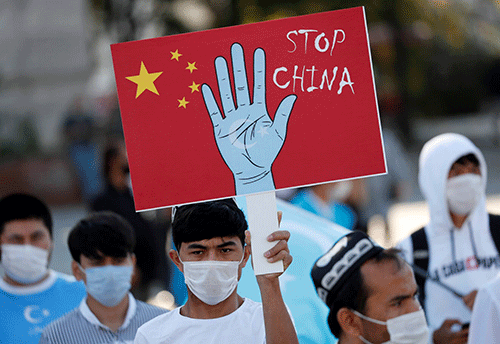Namibia remains resolute in its stance to vote against debating alleged widespread abuses in China’s Xinjiang, citing a recent United Nations motion as being tabled through an ambush, outside normal procedure.
Namibia’s position was clarified by international relations executive director Penda Naanda yesterday. Naanda was responding to questions from New Era after it surfaced that the UN Human Rights Council (OHCHR) last week Thursday in Geneva, Switzerland voted against a “’Western-led’ motion to hold a debate on the human rights situation in China’s Xinjiang Uyghur autonomous region.” Namibia was one of the 19 countries
which rejected the draft decision.
The draft decision was put forward by the United States, Australia, Canada, France, Germany, Norway, Sweden and Turkey, amongst others.
The move allegedly came after former UN rights chief Michelle Bachelet released her Xinjiang report, citing possible crimes against humanity against Uyghurs and
other Muslim minorities in China’s far-western region.
“This is the type of cooperative approach with UN human mechanisms that Namibia encourages for purposes of addressing alleged human rights concerns in a specific country,” Naanda said.
The visit was the first in 17 years by a UN high commissioner for human rights, he emphasised.
“Following the visit to China in May, the former high commissioner appreciated the cooperation showed by the Chinese government, underlined the importance of continued constructive dialogue with China, and indicated that the OHCHR looks forward to building upon this initial visit to China,” he added.
According to Naanda, discussing the motion at the back of Bachelet’s visit is regressive.
“Namibia was, therefore, surprised by the draft decision on China, which sought to put a country on the agenda of the council. This decision would have had the effect of undermining any future cooperation between China and the OHCHR,” he stated.
It would also appear that, at least from Namibia’s vantage point, that the motion on China was brought through the backdoor.
“The proponents of the draft decision sought to put the situation of human rights in Xinjiang on the agenda of the council through a procedural decision, which departs from the standard practice of introducing country-specific situations by way of substantive resolutions,” the diplomat added.
On the day of the vote, Namibia’s representatives advocated against the politicisation of the human rights council, and that it strictly “adheres to the principles of objectivity, non-interference in internal affairs, non-selectivity, impartiality, and respect multilateralism and constructive dialogue. “For these reasons, Namibia voted against this draft decision,” Naanda buttressed.
But on the day of the vote, Western countries thought that by going no further than simply seeking to talk about the findings, enough other nations would vote in their favour.
However, in a moment of knife-edge drama, countries on the 47-member council in Geneva voted 19-17 against holding a debate on human rights in Xinjiang, with 11 nations abstaining.
“This is a victory for developing countries, and a victory for truth and justice,” tweeted Chinese foreign ministry spokeswoman Hua Chunying.
Amnesty International branded the vote farcical, while Human Rights Watch (HRW) said it betrayed abuse victims.
“The United States condemns today’s vote preventing a discussion about Xinjiang,” US ambassador to the council Michele Taylor tweeted.
Alongside Namibia, other nations who voted against the debate were Bolivia, Cameroon, China, Cuba, Eritrea, Gabon, Indonesia, Ivory Coast, Kazakhstan, Mauritania, Nepal, Pakistan, Qatar, Senegal, Sudan, the United Arab Emirates, Uzbekistan and Venezuela.
Meanwhile, Argentina, Armenia, Benin, Brazil, The Gambia, India, Libya, Malawi, Malaysia, Mexico and Ukraine abstained.
Washington and some Western countries have used Xinjiang “to spread rumours and cause trouble, engaging in political manipulation under the guise of human rights, attempting to smear China’s image,” a Chinese foreign ministry spokesperson said in a statement.
“The plot by the US and some Western countries has once again failed. Xinjiang-related issues are fundamentally not
human rights issues, but are counter-terrorism, deradicalisation and anti-separatism issues.”
One Western diplomat stressed that regardless of the outcome, “the number one objective has been fulfilled” in putting Xinjiang in the spotlight.
Bachelet’s report was published minutes before her term ended on 31 August 2022, and highlighted ‘credible’ allegations of widespread torture, arbitrary detention and violations of religious and reproductive rights. It brought UN endorsement to long-running allegations that China detained more than one million Uyghurs and other Muslims and forcibly sterilised women, allegations China vehemently denies.
Amnesty International’s secretary general Agnes Callamard said Thursday’s vote put the council in “the farcical position of ignoring the findings of the UN’s own human rights office”.
“For council member states to vote against even discussing a situation where the UN itself says crimes against humanity may have occurred, makes a mockery of everything the Human Rights Council is supposed to stand for.”
Human Rights Watch’s China director Sophie Richardson called it an “abdication of responsibility and a betrayal of Uyghur victims”. The International Service for Human Rights China advocate Raphael Viana David said: “Council members sent today a dreadful message: China remains so far untouchable.”
African countries, where China is the leading creditor after making massive infrastructure investments, faced particularly heavy lobbying, observers
said. In the end, only Somalia voted ‘yes’ out of 13 countries.
Britain’s ambassador Simon Manley
said the close result nonetheless showed China that “a significant number of countries will not be silenced when it comes to egregious human rights violations”, whoever the perpetrator.


